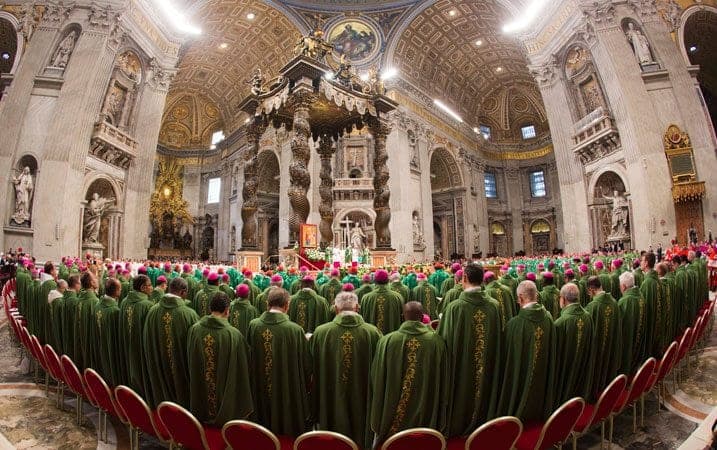ROME — Pope Francis opened this year’s Synod of Bishops on the family Sunday with a stirring defense of traditional marriage coupled with an insistence that the Church must, at the same time, be merciful and compassionate to those who struggle.
During a solemn Mass in St. Peter’s Basilica, concelebrated by the more than 270 bishops from around the world gathered in Rome for the meeting, the pope tackled one of the thorniest issues the prelates will discuss and debate during the next three weeks: How the Church should approach pastoral care for divorced and separated Catholics.
“The man who falls or who errs must be understood and loved,” Francis said in his homily, quoting Pope St. John Paul II. A Church with closed doors “betrays herself and her mission, and, instead of being a bridge, becomes a roadblock.”
The synod, which lasts until Oct. 25, is the second half of a process started last year to examine issues related to the family. A 39-question survey sent to parishes and filled out by clergy and ordinary Catholics showed a significant gap on many issues, such as birth control, between what the Church teaches and what Catholics practice or believe.
Last October, two of the most contentious issues to emerge were whether divorced Catholics who remarried without an annulment of their first marriage should be allowed to receive Communion, and how welcoming the Church should be to gay and lesbian Catholics. And the run-up to this year’s session has shown that those fissures among the bishops and laity still exist.
This year, in his opening speech, Francis tackled the divorced Catholics issue head on, decrying the decline of marriage, particularly in the developed world.
“People are less and less serious about building a solid and fruitful relationship of love … in sickness and in health, for better and for worse, in good times and in bad,” he said, repeating the vows made by spouses at a wedding.
The pope said that the world seems to look down on love that is lasting, faithful, conscientious, stable, and fruitful.
“[It] is increasingly viewed as a quaint relic of the past,” he said.
He pointed out that developed countries have the lowest birth rates and the highest percentages of abortion, divorce, and suicide, as well as social and environmental pollution.
The Church, he said, must be “a crying voice in the desert,” defending faithful love, the sacredness of every life, and the unity and indivisibility of marriage while resisting “passing fads or popular opinions.”
But when Catholics fall short of that ideal, he counseled, the Church must be charitable, not judgmental. And “faithful to her nature as a mother,” the Church must seek out and care for hurting couples with acceptance and mercy, to be a “field hospital” open to whomever knocks in search of help and support, and guide them “to the wellspring of salvation.”
Francis also lamented that so many people are lonely, despite “having many sophisticated means of entertainment, but a deep and growing interior emptiness; many pleasures, but few loves; many liberties, but little freedom.”
He highlighted the elderly, “abandoned even by their loved ones,” widows and widowers, those abandoned by their spouses, migrants and refugees fleeing from war and persecution, and even youths he said are victims of a culture of waste.
Quoting the book of Genesis, “It is not good that the man should be alone; I will make him a helper fit for him,” Francis said that God’s dream for mankind is to “see it fulfilled in the loving union between a man and a woman, rejoicing in their shared journey, fruitful in their mutual gift of self.”
Referring then to Sunday’s Gospel, in which Jesus is asked about divorce, Francis said, “He brings everything back to the beginning of creation, to teach us that God blesses human love, that it is he who joins the hearts of two people who love one another, he who joins them in unity and indissolubility.”
















